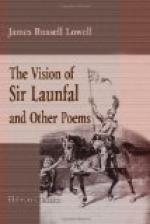230. Carol of its own: Contrasted with the carols that are being sung inside the castle.
231. Burden: The burden or refrain is the part repeated at the end of each stanza of a ballad or song, expressing the main theme or sentiment. Still is in the sense of always, ever.
233. Seneschal: An officer of the castle who had charge of feasts and ceremonies, like the modern Lord Chamberlain of the King’s palace. Note the effect of the striking figure in this line.
237. Window-slits: Narrow perpendicular openings in the wall, serving both as windows and as loopholes from which to fire at an enemy.
238. Build out its piers: The beams of light are like the piers or jetties that extend out from shore into the water to protect ships. Such piers are also built out to protect the shore from the violent wash of the ocean. The poet may possibly, however, have had in mind the piers of a bridge that support the arches and stand against the sweep of the stream.
243. In this line instead of “the weaver Winter” the original has “the frost’s swift shuttles.” Was the change an improvement?
244. A single crow: Note the effect of introducing this lone crow into the bleak landscape.
250. It must not be forgotten that this old Sir Launfal is only in the dream of the real Sir Launfal, who is still lying on the rushes within his own castle. As the poor had often been turned away with cold, heartless selfishness, so he is now turned away from his own “hard gate.”
251. Sate: The use of this archaic form adds to the antique flavor of the poem. So with the use of the word “tree” for cross, in line 281 below. Lowell was passionately fond of the old poets and the quaint language of the early centuries of English literature, and loved to introduce into his own poetry words and phrases from these sources. Of this habit he says:
“If some small savor
creep into my rhyme
Of the old poets, if some
words I use,
Neglected long, which have
the lusty thews
Of that gold-haired and earnest-hearted
time,
Whose loving joy and sorrow
all sublime
Have given our tongue its
starry eminence,—
It is not pride, God knows,
but reverence
Which hath grown in me since
my childhood’s prime.”
254. Recked: Cared for.
255. Surcoat: A long flowing garment worn over the armor, on which was “emblazoned” the coat of arms. If the knight were a crusader, a red cross was embroidered thus on the surcoat.
256. The sign: The sign of the cross, the symbol of humility and love. This is the first real intimation, the keynote, of the transformation that has taken place in Sir Launfal’s soul.
259. Idle mail: Useless, ineffectual protection. This figure carries us back to the “gilded mail,” line 131, in which Sir Launfal “flashed forth” at the beginning of his quest. The poem is full of these minor antitheses, which should be traced by the student.




